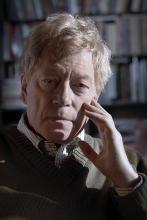Roger Scuton was born 27th February 1944 in Buslingthorpe, Lincolnshire in England to working class parents. He was educated at the prestigious Royal Grammar School, High Wycombe (1954–61), famously being expelled from the school shortly after winning a scholarship to Cambridge University. He read philosophy (“moral sciences”) at Jesus College from 1962, receiving a BA in 1965 and gaining his MA in 1967. He was awarded his PhD in 1972 for a thesis on aesthetics—a topic which would go on to be a long-standing philosophical concern. He became a research fellow at Peterhouse, Cambridge in 1969 and joined Birkbeck College London in 1971. He taught philosophy at Birkbeck until 1992, first as a lecturer, then as a reader and finally as professor of aesthetics. Scruton went on to study law during the 1970s and was called to the bar in 1978, though he never practised.
During the 1980s Scruton published extensively, particularly focused on attempting to shift political conservativism away from economic issues and towards moral ones (see particularly The Meaning of Conservativism from 1980). Scruton was also heavily involved in supporting Communist dissidents in Eastern European countries under USSR rule, helping to establish underground education networks among students and political activists. After leaving Birkbeck in the 1990s, Scruton returned to academia during the 2000s. From 2005–2009 he was research professor at the Institute for the Psychological Sciences in Arlington, Virginia, and from 2009 held a visiting scholarship at the American Enterprise Institute in Washington. In 2010 he was visiting professor at Oxford teaching graduate courses in aesthetics and is also research professor at Buckingham University. In 2010 he delivered the Gifford Lecture at the University of St Andrews under the title “The Face of God.”
Throughout his career Scruton has focused primarily on aesthetics, conservative politics and political culture, viewing all three as closely interlinked. Aesthetics, Scruton argues, is about the appreciation of something for its own sake, which closely ties into his conservativism. Scruton identifies his political awakening as occurring when he witnessed the radical student protests of 1968 in France and realised that “I wanted to conserve things rather than pull them down” (The Guardian, 28 October 2000). This conservativism has led Scruton to argue, alongside T.S. Eliot, that true originality is only conceivable within a tradition. Within the fractured subjectivity of postmodernity, the conservative project acquires new and vital importance.
Over the course of his career Scruton has written over 40 books, including How to Be a Conservative (2014), Immigration, Multiculturalism and the Need to Defend the Nation State (2006) and The Meaning Of Conservatism (1980).



